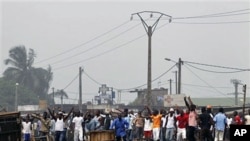An official of the Economic Community of West African States (ECOWAS) has expressed concern that growing divisions among African leaders are undermining the sub-regional body’s efforts to resolve the ongoing crisis in Ivory Coast.
Sonny Ugoh, communications director of ECOWAS, said his organization is consulting with its international partners to find a solution to the Ivorian crisis.
“Obviously, there is beginning to be discordant voices in Africa regarding the situation there (Ivory Coast). The position of ECOWAS is that (Alassane) Ouattara won the election. But now, when you begin to get some sections of the African continent to suggest that that is not the case, then we begin to have a problem,” said Ugoh.
The sub-regional bloc also expressed concern about a South African naval vessel, which was seen docked at a port in Ivory Coast. At a news conference before his trip to Guinea, the ECOWAS commission’s president, Ambassador James Victor Gbeho, said, “As we talk now, there is a South African warship docked in Cote d'Ivoire. Now actions such as that can only complicate the matter further.”
“When things like that happen, it might be misconstrued to suggest that they (South Africa) are in support of a particular party in the crisis there and that would not contribute to the resolution of the crisis there. If you create that kind of situation, there is likelihood that it will prolong the resolution of the problem,” said Ugoh, communications director of ECOWAS.
African Union mediators have arrived in the commercial capital, Abidjan, for another attempt to resolve the crisis. Analysts say divisions among African leaders surfaced during the recent A.U. summit in Ethiopia.
Ugoh said the Ivorian crisis is a delicate one which he said needs a careful and well-thought-out solution.
“It is important for us to maintain the status quo and give time for the engagement that is ongoing to be concluded because I think that is what is important. We don’t want a situation where (conditions) will deteriorate and, suddenly, we have a civil war in our hands,” said Ugoh.
The mediators are to meet with representatives of the two rival presidents and report their findings to an A.U.-appointed panel of five heads of state. The A.U. says the panel will then make legally-binding decisions about the impasse.
Laurent Gbagbo, the incumbent, has said he will not accept any finding that does not recognize him as the winner of the presidential poll.
Mr. Gbagbo still controls Ivory Coast's security forces and state institutions. President-elect Ouattara continues to operate out of an Abidjan hotel that is surrounded by both pro-Gbagbo security forces and U.N. peacekeepers, which are protecting the building.
Residents in Abidjan say at least three people have been killed in clashes linked to the country's political crisis.
Witnesses say the bodies of three people were discovered after fighting on Monday between security forces loyal to incumbent President Gbagbo and supporters of Mr. Ouattara.
Monday's clashes broke out in the pro-Ouattara neighborhood of Abobo, where deadly fighting between the two mens’ supporters took place last month.




